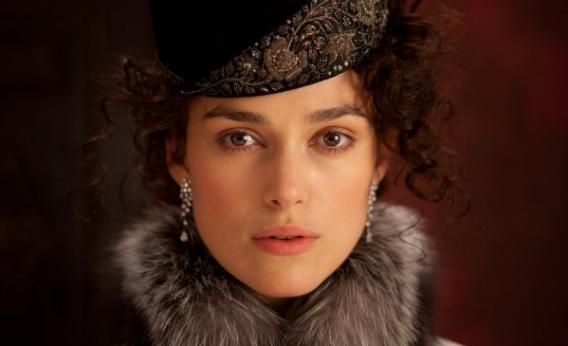
Keira Knightley as Anna Karenina (Laurie Sparham)
Following at least 25 other filmed adaptations, Joe Wright’s dazzling looking new version of Tolstoy’s Anna Karenina symbolically sets the romantic crimes and social punishments of Russian imperial society into an amazingly adaptable theater, where everyone is required to play expected roles. It transforms into a formal ball, skating rink, race track, an aristocratic salon, and an opera house, where the nervous flicker of a shunned adulteress’s fan drowns out an orchestra. The private lives of this strictly stratified society play out backstage, in the wings, and on smoky trains.
Complicated family ties and sexual intrigue set the stage. Anna (Keira Knightley) briefly leaves St. Petersburg, her husband Karenin (Jude Law), and their young son to convince her distraught, ever-pregnant sister-in-law Dolly (Kelly Macdonald) in Moscow to once again forgive Anna’s blithely unfaithful brother, Stepan Oblonsky (Matthew Macfadyen), for his latest fling. Her train car companion, the jaded Countess Vronsky (Olivia Williams), introduces Anna to her son, the dashing officer Count Alexei Vronsky (Aaron Taylor-Johnson), who is instantly smitten. His pursuit of her is so relentless that she can barely catch her breath, and scandalously public. His brazen behavior at a ball embarrasses Dolly’s younger sister Kitty (Alicia Vikander), who had flattered herself that the count was her suitor, so she’s in no mood to accept a proposal of marriage from Oblonsky’s serious-minded best friend, Konstantin Levin (Domhnall Gleeson).
Wright’s production conception, with the same creative team from his Pride & Prejudice (2005) and Atonement (2007), almost overwhelms the relationships, like in a Baz Luhrmann production, and makes the film feel like a musical, propelled by Dario Marianelli’s best score and the ensemble scenes choreographed by Sidi Larbi Cherkaoui. Even Oblonsky’s offices in the Russian bureaucracy seem to exist in a Gilbert and Sullivan world.
For all of Knightley’s flamboyant costume changes (at one point a hoop skirt looks like an imprisoning cage) and her tormented conflict between her obligations to the staid husband she married too young, her lust for Vronsky, and her maternal feelings for her children, the triangles of obligation vs. passion get tiresome with recriminations, jealousies, and lots of Anna’s tears, partly because the pallid images of masculinity don’t match how she so gorgeously fills the screen, despite such attractive male actors.
Taylor-Johnson, who has been so magnetic since his first lead role in Nowhere Boy (2006), seems emotionally overwhelmed by his mustache and military uniforms, even as he lithely moves like a dancer. His determined chase towards Anna’s surrender is more a calculated Dangerous Liaisons-like bet against a virtuous wife, despite flashes of panting tumbles into bed. Jude Law stiffly labors under middle-aged make-up and induced balding to hide his former “Sexiest Man Alive” title, though he conveys a fondness, in his fashion, toward the younger, cheating wife he tries to control. Even the former Mr. Darcy himself, Macfadyen, just seems a fatuous sensualist in a large mustache, guiltily treating his many children to ever more toys and childishly delighting in yet another extra-marital dalliance off-screen. For Anna, that train becomes more and more a phallic alternative.
Surprising to those who haven’t read the novel, another romance captures the audience’s affections more, which has received far less attention in earlier film and television adaptations. At first, Kitty is just an annoying teenager with a crush and petty jealousy, making Levin’s devotion to her foolish. But the heart of the film shifts when Levin leaves the artificiality of the theatrical environment in the big, gossipy city to his farm where he wrestles with his idealism about the land. (Tom Stoppard’s screenplay has extensive philosophical narration from Levin’s diaries in the novel.)
As varied and beautiful as Seamus McGarvey’s energetic cinematography is throughout, the harvest scenes are stunning as Levin joins with the peasants, freed a dozen years earlier as serfs, in the choreography of rhythmic scything. But as Kitty, who matures convincingly to become his tender wife, Vikander (A Royal Affair) commands the screen in her first English-language role. While the rest of this Anna Karenina is a busy eyeful of sturm und drang, the gentler love story of Kitty and Levin outshines the tragedy.

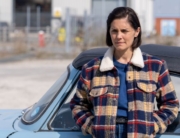
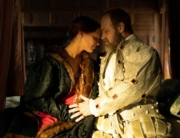
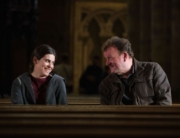
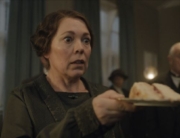
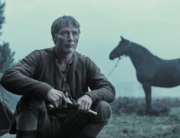
Leave A Comment